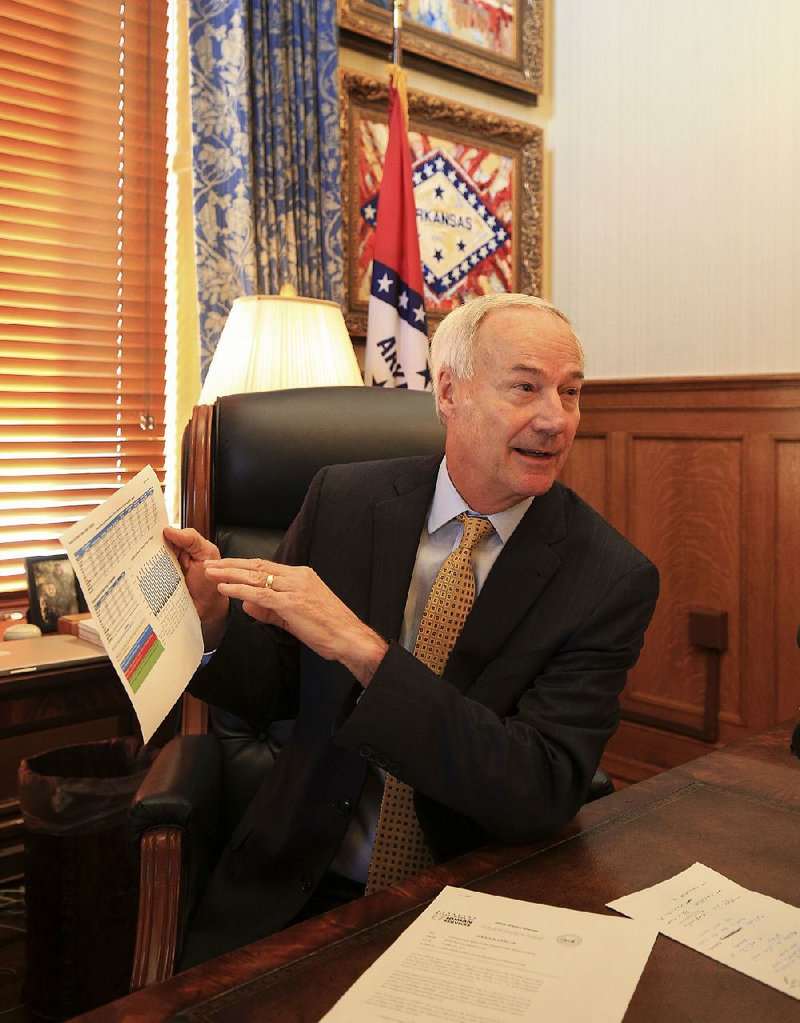Gov. Asa Hutchinson said Wednesday that he never expected a herbicide would consume so much of his time and involve a "row-crop tour" this summer of northeast Arkansas fields where farmers reported damage from the dicamba herbicide.
"I never thought when I got elected governor [in 2014], that one of the top issues I'd have to face was dicamba," Hutchinson told a few hundred farmers, their spouses and others gathered in Little Rock for the opening session of the 83rd convention of the Arkansas Farm Bureau.
"I hope half the people don't leave when I say that word," Hutchinson said. "But I've had to deal with that, and I have learned to rely on the expertise of the Plant Board."
The state Plant Board, a division of the Arkansas Department of Agriculture, voted Nov. 8 to prohibit the in-crop use of dicamba from April 16 through Oct. 31 next year to avoid a repeat of this summer, when soybean farmers and other growers filed nearly 1,000 complaints of damage.
During the height of the summer, with complaints rolling in, Hutchinson visited with farmers in Pocahontas, Wynne, Stuttgart, Leachville and Success. "Sometime you just got to get out of Little Rock to put life in perspective a little bit better," Hutchinson said of the "row-crop tour" and other visits recently in the state.
"I've listened to what people had to say," he said. "I enjoyed that tour, seeing farmers as they worked and [hearing] the concerns they had."
Monsanto, the Missouri-based seed and chemical company, sued the board in October for keeping its new dicamba formulation, called Xtendimax, out of the Arkansas market this past growing season. The company updated the lawsuit after the Plant Board's Nov. 8 vote for next year's restrictions.
Monsanto developed dicamba-tolerant soybeans and cotton to help farmers control weeds that have grown resistant to other herbicides. But dicamba can damage conventional soybeans, produce and ornamentals through off-target movement.
Hutchinson has backed the Plant Board at least twice in major decisions in 2016 and 2017 to restrict the dicamba formulations made by Monsanto and other companies. Hutchinson has let the Plant Board's restrictions for next year bypass further review by his office, moving them along to legislative review early next month.
"This issue has divided our row-crop farmers, and you need to understand that I listened to the expertise of the Plant Board and I do support them," Hutchinson said. "But I do ask them to expedite research and look for new means to protect against volatility and drift and safeguard our crops but still have access to the technology when those safeguards are in place."
Hutchinson also noted the work of state foresters and county judges this year.
"I do recognize it's been a tough year for farmers -- flooding in the spring and too little rain in the fall," Hutchinson said. "County judges have moved from flooding issues to a burn ban in a number of counties. We've had more than 1,300 wild fires this year that have consumed over 23,000 acres, second only to the fires we had in 2012, and the year's not yet over. What's challenging for us is that there's not a whole lot of rain in sight in the coming weeks."
In his 20-minute address, Hutchinson also said he has consistently tried to make President Donald Trump's administration aware of the importance of trade agreements to Arkansas' economy, especially agriculture.
"You have to acknowledge that we have lost manufacturing jobs in Arkansas to Mexico" with the North American Free Trade Agreement of the mid-1990s, Hutchinson said, citing the closure of Whirlpool Corp. in Fort Smith several years ago.
"That was a heartbreak in Fort Smith," he said. "You have to acknowledge that that shift has happened ... but the exchange has settled in somewhat and we are now selling Mexico and Canada more goods and commodities than we are buying."
Hutchinson said Arkansas agriculture exports in 2016 amounted to $179 million to Canada and $177 million to Mexico. Hutchinson said China's recent agreements to accept United States beef and rice also will benefit Arkansas, the nation's top rice producer.
Manufacturing in Arkansas also is doing better under the trade agreement, Hutchinson said.
"There are many parts now in products that are being manufactured by companies right here in Arkansas that are shipped to Mexico for further assembly, and then they're sent back to the United States for final assembly," he said, citing specific plants in Hot Springs, Texarkana and Marion. "It's an integrated economy that you cannot stop," he said.
The convention of the Farm Bureau, with more than 190,000 member-families in Arkansas, continues through Friday at the Statehouse Convention Center and the Marriott Hotel.
Business on 11/30/2017
